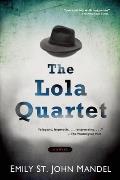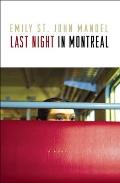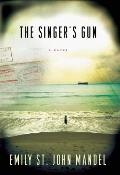
When it happens, it feels like winning the lottery. An email arrives out of the blue, from one of my publishers or a festival director or a member of a festival's staff: Would I like to come to a festival? In Canada, in Australia, in France? The answer is always yes because, the obvious pleasures of traveling to these places aside, this is what they're offering: a week, sometimes longer, when I don't have to be anything but a writer.
÷ ÷ ÷
It probably goes without saying by now that this is not a glamorous life. There are glamorous moments, but they cause a certain psychic whiplash because they're followed so rapidly by non-glamour. The most glamorous photo of me ever taken, for example, was at a charity ball in Toronto in 2010 or 2011, shot for one of those "here are pictures of people at a fancy event!" pages in one of Canada's national newspapers. In the photograph I am smiling in a long silk gown, identified by profession and by my first and middle names. ("Author Emily St. John." In all fairness, my middle name is very surname-like.)
Twenty hours later I'm on a packed subway train in the New York City rush hour, the silk gown rolled up in the overnight bag at my feet. I caught a morning flight out of Toronto, went directly from the airport to my day job because I'm out of vacation days — I am always out of vacation days, because of book touring — and spent a few hours filing packing slips and tinkering with financial spreadsheets and scheduling meetings for my boss. Was I just in Toronto? Did I really go to a fancy party in a foreign city last night? It seems like it might've been a dream.
÷ ÷ ÷
The truth is, the double life is disorienting. I'm a novelist, except when I'm an administrative assistant in a cancer research lab, which is five half-days per week. The length of the commute is such that the job takes up most of every day. I'm not complaining. Almost every writer I know has a day job, and I feel extraordinarily lucky to have found one that provides that extremely elusive combination of health insurance and part-time hours. The campus where I work is beautiful. There are worse fates than spending the better part of each day in the company of pleasant and brilliant scientists.
But the double life is by nature a life filled with wistfulness. There are moments of quiet desperation in front of Excel spreadsheets. I would do anything to be writing at this moment, I find myself thinking, but obviously that isn't true, because if I were really willing to do anything to write full-time, then presumably I'd throw caution and financial stability and health insurance to the wind and just do it. Instead of throwing caution to the wind, I revise my novels in the F train on the way home from work, because I've seen what can happen to people without health insurance.
÷ ÷ ÷
There are festivals in the United States, but there isn't a lot of government funding for the arts here, so the American festival experience is necessarily a somewhat hurried affair: you fly into a given city and 24 hours later you're back at the airport, a little dazed, comparing notes with other outbound authors over cheese quesadillas.
In countries where the arts are more heavily subsidized, the festival experience is a little different. "Welcome to the Westin Harbour Castle, Ms. Mandel," the hotel receptionist said in Toronto, when I arrived for the International Festival of Authors last October. "We have you staying with us for seven nights."
 That was a month after my Midwest tour. The Midwest tour was five cities in five days, St. Louis/St. Paul/Traverse City/Milwaukee/Chicago, flights at 6 or 7 a.m. every morning to get to the next place, a blur of cheap hotel rooms and airports. I loved it and also thought I might die of exhaustion.
That was a month after my Midwest tour. The Midwest tour was five cities in five days, St. Louis/St. Paul/Traverse City/Milwaukee/Chicago, flights at 6 or 7 a.m. every morning to get to the next place, a blur of cheap hotel rooms and airports. I loved it and also thought I might die of exhaustion.
The long-haul festivals are the opposite of this. You are flown to a city and put up in a lovely hotel for up to a week, during which time you might have no more than two events, several days apart. American writers always look a little skeptical when I tell them this, but I swear you're actually handed an envelope of cash on arrival. This is your per diem, but at some festivals you don't really have much in the way of daily expenses, because at some festivals they also buy you dinner. You receive an honorarium for each of your events. You spend the week meeting other writers, going to readings, and forgetting all of the parts of your life that aren't related to books.
÷ ÷ ÷
My adoration of these long-haul festivals is rooted in something that's difficult to fully articulate: when I'm at one of these festivals, I'm only living one life. Instead of being an administrative assistant and a writer, I'm only a writer. For a single precious week, the fiendish complications of my day-to-day life in New York City mostly recede.
It isn't that these complications vanish entirely. "What did you do with your morning off?" a British author asked me at Adelaide Writers' Week, when we found ourselves milling about in the foyer of a restaurant where we'd been driven for lunch.
"I reconciled the American Express statement for my day job," I said.
"Well," he said, "someone had to do it."
But what's an hour or two in a hotel room with an American Express statement and an Excel spreadsheet, compared to the usual daily frenzy? The truth is, I wake most mornings in New York with the same desperate thought: today is another day when I won't have enough time to write. I've never found a way to balance the day job and the writing life. There is never enough time. Every day feels impossible until I make it to evening. Through a process I don't entirely understand, after approximately two-and-a-half years of these days, I generally manage to produce a book.
÷ ÷ ÷
Adelaide Writers' Week is held in a park. There are tents for books and food, and two stages set up under the trees with extra awnings for shade. This sunburned country. The Australians seem concerned about my skin, which is nice of them. I'm much paler than they are. I think my ancestors managed to collect all the palest genes in Europe before they set out for the New World. "Are you wearing lots of Factor 30?" someone asks at least once a day. Yes. A lot. I leave blue-white smudges of zinc oxide sunblock everywhere I go.
But the questionable ozone layer aside, my week there is idyllic. The panels are fascinating. There are beautiful birds in the trees. A flock of green parrots flies over a poetry reading and my breath catches in my throat.
After each of my events, I sit at a signing table in the shade. A man gives me a book to sign, but when I open it I discover my signature's already there. What this means is that I signed it, somewhere in the United States, and then the bookstore eventually returned it to the publisher, who shipped it out to Australia for the Adelaide festival. What are the odds, I wonder, of encountering the same book twice on different continents? I'm curiously moved.
÷ ÷ ÷
 The festivals feel sometimes like temporary, self-contained little societies that break apart and re-form in different configurations over the passage of years. Eventually, there are recurring characters. I meet a charming Australian thriller writer at IFOA in Toronto in 2010, and then again in the 2012 edition of the same festival, and then again six months later in Adelaide, his home country, where he looks perfectly in his element in the dazzling sunlight while I sweat under an umbrella and wonder about the ozone layer.
The festivals feel sometimes like temporary, self-contained little societies that break apart and re-form in different configurations over the passage of years. Eventually, there are recurring characters. I meet a charming Australian thriller writer at IFOA in Toronto in 2010, and then again in the 2012 edition of the same festival, and then again six months later in Adelaide, his home country, where he looks perfectly in his element in the dazzling sunlight while I sweat under an umbrella and wonder about the ozone layer.
In Adelaide I have a panel with a novelist whom I last saw some years ago, when we were on a panel together at the Denman Island festival. I'm on a panel with another Brooklyn-based Emily two festivals in a row, Vancouver and then Toronto; we both live in Brooklyn, but we don't see each other there. In Australia I spend time with a Canadian poet whose work I greatly admired when we were in Calgary together in 2009.
In Adelaide I meet S., which isn't even her real initial but I'll call her S. here, because she's an extremely private person, the sort of writer who isn't on social media and won't even tell interviewers whether she's married or not, in fact refuses to answer any interview questions that aren't directly related to her work, which is a stance I greatly respect: When did it become so important to market ourselves, as writers, as people, as brands, when the only point was supposed to be the text? We make plans to meet up in another city at some later date, S. and I, and then S. goes on to another festival in a different part of Australia. I don't go to this other festival, but when I look it up online I realize that I know several of the other writers who are attending. I met them in Toronto, in Calgary, in Vancouver.
I realize that with the passage of years and eventually decades, I'll know more and more of these people. Some of them I'll see once and then never again. Others I'll meet now and again, in one country or another, and for a week or several days or a few hours we'll be friends.
More from Emily St. John Mandel: